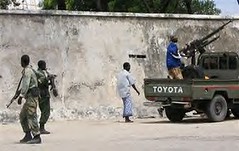
Somalis walk pass US-backed Ethiopian troops and surrogate Somalis amid an occupation planned and paid for by Washington, DC.
Originally uploaded by Pan-African News Wire File Photos.
Shabelle Media Network (Mogadishu)
January 21, 2007
By The Star
Mogadishu
About 200 Somali Canadians and their supporters demonstrated against American involvement in Somalia yesterday at the U.S. consulate in downtown Toronto.
Waving signs that read "Stop Bush's war on terror," "U.S. stop proxy war" and "Troops out of Somalia now," the peaceful crowd listened to speakers decrying recent U.S. air strikes that missed their Al Qaeda targets but killed 70 nomadic herdsmen, according to British aid agency Oxfam.
The U.S. denied reports of civilian casualties.
"We are upset by recent developments, especially the use of military force," said Shukria Dini, one of the event's organizers, a member of the Coalition of Concerned Somali-Canadians and a graduate student in women's studies at York University.
"This is not about religion - I'm not supporting Islamic groups. It's about illegal occupation by foreign troops."
U.S. forces entered Somalia in December when Ethiopia launched an attack against Somalia's Islamic movement. U.S. officials told Associated Press this month special forces were in Somalia hunting Al Qaeda fighters and providing military advice to Ethiopian and Somali forces.
Somalia, a country of 7 million, has been consumed by civil war since clan warlords toppled dictator Mohamed Siad Barre in 1991.
COMMENTARY
Oil, not terrorists, the reason for US attack on Somalia
Story by WANJOHI KABUKURU
Kenya Daily Nation
Publication Date: 1/22/2007
JUST WHY DID THE US ATTACK Somalia two weeks ago? Of course, the answer given for the US military intervention and the generally accepted notion is the hunt for terrorists. But is it?
Are terrorists the only bone of contention the US has with Somalia? When the US military devised “Operation Restore Hope” in 1993 which was short-lived after they were whipsawed by rag-tag militia in and around Mogadishu, were they fighting the ‘war on terror’?
They couldn’t have been because this war was to start much later, If anything it is a post-Sept 11 phenomenon. So then why did the US bomb ICU extremists in the name of Al Qaeda terrorists and not throughout last year when they occupied Mogadishu?
Just why is Somalia so important to the US, and by extension the big boys of Europe and some Gulf states?
A UN Somalia Monitoring Group report released in November 2005 reveals that a dozen countries, namely Yemen, Djibouti, Libya, Egypt, Kazakhstan, Ethiopia, Iran, Syria, Eritrea, Lebanon, Saudi Arabia and Uganda were all poking their noses into the Somalia pie.
What the UN Somalia Monitoring Group didn’t reveal, however, is that these were not the only countries which were interested in the country.
The little known yet well-heeled contact group, consisting of Norway, the US, UK, France and Tanzania (just an appendage) are also deeply enmeshed in Somalia.
While the terrorism theory holds some water, the reality of the factors contributing to the mess in Somalia is pegged on natural resources. Oil and gas are Somalia’s Achilles heel. It is an open secret that four US oil giants are sitting pretty on money-spinning concessions expecting to reap huge windfalls from massive resources of both oil and gas in Somalia.
The story of Somalia and oil goes back to the colonial period. British and Italian geologists first identified oil deposits during that period of imperialism.
The first oil wells historically referred to as the Daga Shabell series were dug in the 1960s. Tiny gas discoveries adjacent to Socotra were also noted..
The race for these precious natural resources took a new turn in 1988, when the United Nations Development Programme (UNDP) and the World Bank, with the support of the governments of Britain, France and Canada and backed by several Western oil companies financed a regional hydrocarbon study of the countries bordering the Red Sea and the Gulf of Eden.
The countries were Somalia, Ethiopia and Saudi Arabia. Saudi Arabia was later dropped, but not before it had been established that within the study area, massive deposits of oil and gas existed.
The results of the findings were presented to a three-day American Association of Petroleum Geologists, Eastern Hemisphere group conference, in London in September, 1991. Is there oil in Somalia? Listen to the answer:
“It’s there. There’s no doubt there’s oil there,” said geologist Thomas E. O’Connor, the World Bank’s principal petroleum engineer, who steered the in-depth, three-year study of oil prospects in Somalia’s Gulf of Eden in the northern coastal region.
The study was intended to encourage private investment in the petroleum potential of eight African nations. The conclusions of their findings are quite telling as the geologists put Somalia and Sudan at the top of the list of prospective commercial oil producers.
While presenting their results during the conference, two geologists involved in the study (an American and an Egyptian) reported that the investigation of nine exploratory wells dug in Somalia pointed out that the region was “situated within the oil window, and thus (is) highly prospective for gas and oil.”
Geologist, Z. R. Beydoun, who was involved in the survey, noted that “the geological parameters conducive to the generation, expulsion and trapping of significant amounts of oil and gas” were within the offshore sites. Soon after a race for lucrative deals kicked off in earnest.
Four US oil companies, namely Conoco, Chevron, Amoco and Philips have concessions in nearly two thirds of Somalia. This quartet of oil conglomerates was granted these contracts in the final days of Somalia’s deposed dictator, Siad Barre. The US first military engagement in Somalia was fully supported by Conoco.
----------------------------------------------------------
Mr Kabukuru is a Nairobi-based freelance journalist
No comments:
Post a Comment